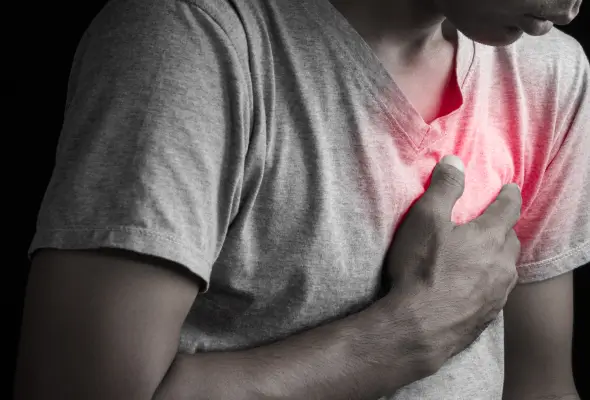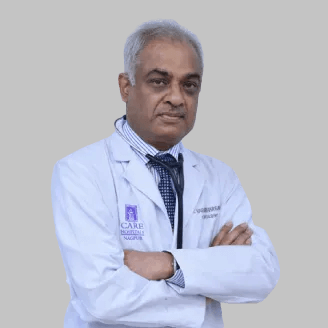-
Doctors
-
Specialities & Treatments
Centre of Excellence
Specialties
Treatments and Procedures
Hospitals & Directions HyderabadCARE Hospitals, Banjara Hills CARE Outpatient Centre, Banjara Hills CARE Hospitals, HITEC City CARE Hospitals, Nampally Gurunanak CARE Hospitals, Musheerabad CARE Hospitals Outpatient Centre, HITEC City CARE Hospitals, Malakpet
HyderabadCARE Hospitals, Banjara Hills CARE Outpatient Centre, Banjara Hills CARE Hospitals, HITEC City CARE Hospitals, Nampally Gurunanak CARE Hospitals, Musheerabad CARE Hospitals Outpatient Centre, HITEC City CARE Hospitals, Malakpet Raipur
Raipur
 Bhubaneswar
Bhubaneswar Visakhapatnam
Visakhapatnam
 Nagpur
Nagpur
 Indore
Indore
 Chh. Sambhajinagar
Chh. SambhajinagarClinics & Medical Centers
Book an AppointmentContact Us
Online Lab Reports
Book an Appointment
Consult Super-Specialist Doctors at CARE Hospitals

Heart Palpitations
Symptom, Causes, Diagnosis and Treatment
Heart Palpitations
Heart racing or fluttering unexpectedly, known as heart palpitations, can be unsettling and often leave people wondering about their heart health. Heart palpitations are a common occurrence that affects many individuals at some point in their lives. While they can be alarming, in most cases, they are harmless and do not indicate a serious underlying condition.

What are Heart Palpitations?
Heart palpitations are sensations that make you feel like your heart is pounding, racing, or fluttering. These feelings can occur in your chest, throat, or neck. Heart palpitations can happen anytime, even during rest or normal activities. These sensations typically last a few seconds or minutes but sometimes persist longer.
While they may be startling, heart palpitations are usually common. About 16% of people visit their primary care physician due to palpitation complaints. Heart palpitations are generally harmless; in rare cases, they may indicate a more serious cardiac condition that requires treatment.
Heart Palpitations Causes
The following are some common reasons for heart palpitations:
- Emotional Factors: Anxiety, stress, or panic attacks often trigger these sensations.
- Lifestyle Choices: Caffeine, nicotine, illicit drugs, and alcohol consumption can cause palpitations.
- Vigorous Physical Activity: Physical exertion during exercise can cause palpitations.
- After Food: Some individuals may experience heart palpitations after eating heavy meals rich in sugar, carbohydrates, spices, MSG, monosodium glutamate, and fat.
- Medications: Certain medicines like decongestants, asthma inhalers, diet pills, and drugs for underactive thyroid may cause palpitations as a side effect.
- Systemic Conditions: Certain medical conditions, including thyroid disorders, anaemia, and low blood sugar, may lead to heart palpitations.
- Hormonal Factor: Hormonal changes during pregnancy or menopause can also contribute.
- Heart Conditions: Heart palpitations sometimes result from underlying heart conditions, such as arrhythmias or valve problems.
- Electrolyte Factors: Electrolyte imbalances and low oxygen levels in the blood are additional potential causes.
Heart Palpitations Symptoms
Heart palpitations often manifest as a heightened awareness of one's heartbeat.
While heart palpitations are not always serious, they can sometimes indicate underlying heart issues. Palpitation can be an overly fast pulse called tachycardia or a slow heartbeat called bradycardia. Individuals may sometimes experience dizziness, chest pain, or shortness of breath alongside palpitations.
It's important to note that palpitations can occur even when the heart's rhythm is normal, and not all people with palpitations will have noticeable symptoms.
Risk Factors
Several factors increase the likelihood of experiencing heart palpitations, such as:
- Females and individuals assigned female at birth are more prone to these sensations.
- Food rich in MSG, nitrates, or sodium may increase the risk of heart palpitations.
- The increased heart rate and blood volume to support the baby during pregnancy often lead to this symptom.
- Gastrointestinal infection that causes vomiting and diarrhoea may increase the risk of heart palpitations.
- Poor or lack of sleep can increase the likelihood of experiencing heart palpitations.
- Severe blood loss may also increase the risk of this symptom.
- Dehydration also has an impact on the occurrence of heart palpitations.
- Lifestyle factors play a role, too. Excessive caffeine intake, laxative use, and anxiety can all contribute to heart palpitations.
Complications
While heart palpitations are usually harmless, they can sometimes indicate more serious issues, such as:
- Palpitations caused by significant drops in blood pressure or irregular heartbeats may cause fainting due to reduced blood flow to the brain.
- If left untreated, prolonged or frequent heart palpitations, especially those caused by arrhythmias, can weaken the heart over time, possibly leading to heart failure.
- Heart palpitations due to underlying cardiovascular diseases may cause life-threatening situations, such as stroke, heart failure, or sudden cardiac arrest.
Diagnosis
Diagnosis of heart palpitations includes a comprehensive approach, such as:
- Medical History and Physical Evaluation:
- Doctors will discuss the patient's symptoms and medical history of systemic diseases and conduct a physical assessment. They listen to the heart using a stethoscope and look for signs of underlying conditions.
- Laboratory Tests:
- Blood tests to check for anaemia, vitamin deficiencies, or hormonal imbalances.
- An electrocardiogram (ECG) helps measure the heart's electrical activity.
- Holter monitoring to continuously record heart rhythm for over 24 hours or more
- Doctors may use event monitoring for less frequent palpitations, allowing patients to record their heart activity when symptoms occur.
- An echocardiogram to detect blood flow and structure problems with the heart.
Treatment for Heart Palpitations
The approach to treating heart palpitations depends on their underlying cause. Often, no specific treatment is necessary if the heart palpitations are not due to a serious condition.
- Medications: Doctors may prescribe appropriate medications to control the condition if a medical issue is identified.
- If a heart condition causes palpitations, doctors prescribe beta-blockers, calcium channel blockers, or antiarrhythmic drugs.
- Thyroid medications
- Electrolytes
- Hormonal therapy
- Lifestyle Adjustments: For some individuals, lifestyle changes can help manage palpitations. These may involve reducing caffeine and alcohol intake, quitting smoking, and managing stress through relaxation methods.
- Surgical Intervention: In rare cases where medications are ineffective, procedures such as catheter ablation or the implantation of a pacemaker might be considered.
When to See a Doctor
While heart palpitations are often harmless, certain situations warrant medical attention. Contact your doctor if you have palpitations that occur with other symptoms like:
- Chest pain
- Dizziness
- Fainting
- Loss of consciousness
- Confusion
- Shortness of breath
- Unusual sweating
- Pain in your arms, neck, jaw, shoulder, or upper back
- A resting heart beats of more than 100 beats per minute
Preventions
Several lifestyle changes can be effective in preventing heart palpitations, including:
- Reducing stress through relaxation practices like meditation, yoga, or deep breathing helps manage symptoms.
- Avoiding triggers such as caffeine, nicotine, and energy drinks is crucial.
- Staying hydrated by drinking plenty of water can prevent heart palpitations caused by dehydration.
- A balanced diet enriched in fruits, vegetables, and whole grain products while limiting saturated fats and processed foods supports heart health.
- Regular exercise strengthens the heart and reduces stress, but it's essential to identify any problematic types of exercise.
- Keeping track of episodes and sharing them with a doctor aids in identifying issues requiring treatment.
- Individuals can effectively reduce or eliminate heart palpitations and improve overall cardiovascular health by making these changes.
Conclusion
Understanding heart palpitations has a significant impact on managing one's health effectively. While often harmless, these sensations can sometimes signal underlying
issues that need attention. By recognising the various causes, from everyday triggers like caffeine to more serious medical conditions, people can take several proactive measures to manage their heart health. It's crucial to remember that while certain risk factors exist, heart palpitations can affect anyone at different stages of life.
For those experiencing persistent or concerning symptoms, consulting a doctor ensures proper diagnosis and treatment if needed. By staying informed and attentive to our bodies, we can confidently navigate the world of heart palpitations and take charge of our cardiovascular well-being.
FAQ's
1. Who does it affect?
Heart palpitations can affect anyone, but they're more common in women and people assigned female at birth. They can occur at various life stages, including adolescence, pregnancy, and menopause.
2. When do people get palpitations?
People may experience sudden heart palpitations at different times, often triggered by anxiety, stress, caffeine intake, alcohol consumption, or certain medications. They can also occur during exercise or when lying down at night.
3. Will heart palpitations go away?
Most heart palpitations are harmless and go away on their own. Reducing caffeine intake, managing stress, and avoiding triggers can help alleviate symptoms. However, persistent or severe palpitations may require medical attention.
4. When should I worry about heart palpitations?
Seek immediate medical help if palpitations are accompanied by chest discomfort or pain, shortness of breath, dizziness, or fainting. Also, consult a doctor if palpitations are frequent, worsen over time, or occur with other concerning symptoms.
5. How long will I have heart palpitations?
The duration of heart palpitations varies. Most episodes last only a few seconds or minutes. However, some people may experience them longer, mainly if underlying conditions exist.
6. How do I stop palpitations?
To reduce heart palpitations, try relaxation techniques like deep breathing or meditation. Avoid triggers such as caffeine, nicotine, and alcohol. Regular physical activity and maintaining a healthy lifestyle can also help manage symptoms.
7. How long do heart palpitations last?
Heart palpitations typically last for a few seconds to a few minutes. However, in some cases, they may persist for longer periods. If palpitations last for an extended time or occur frequently, it's advisable to consult a doctor.
To Book an Appointment, call:
Still Have a Question?




